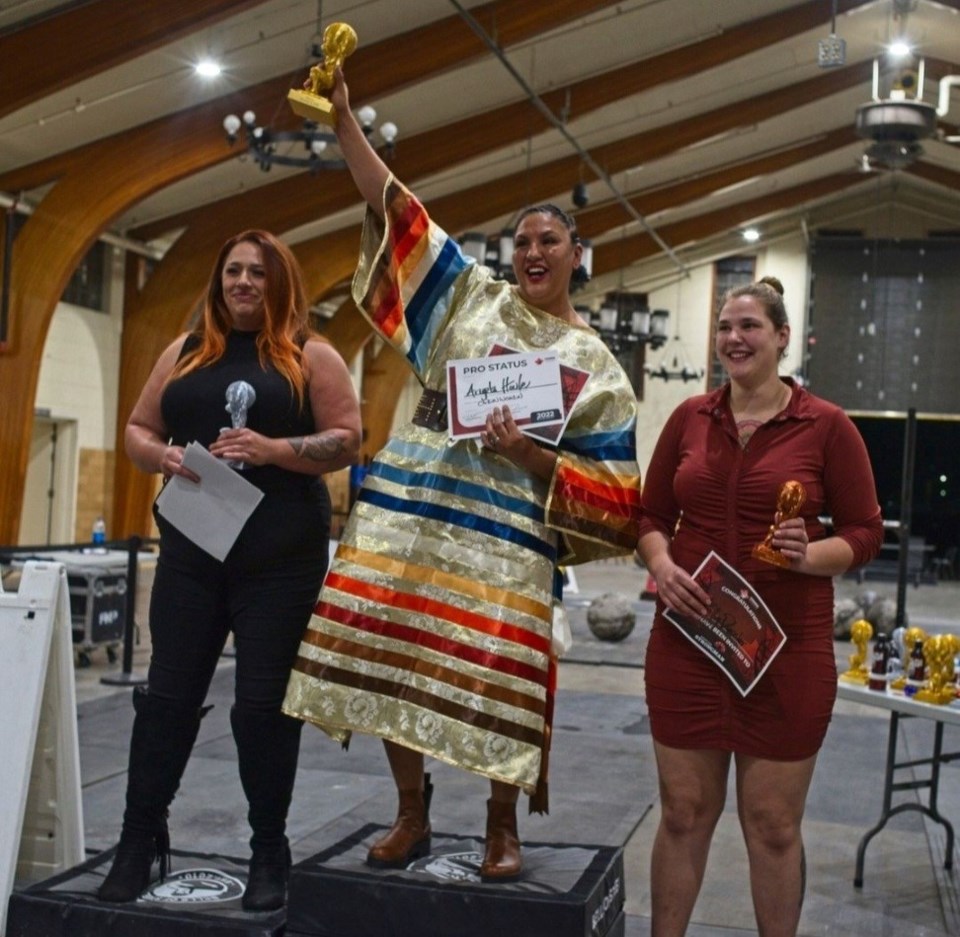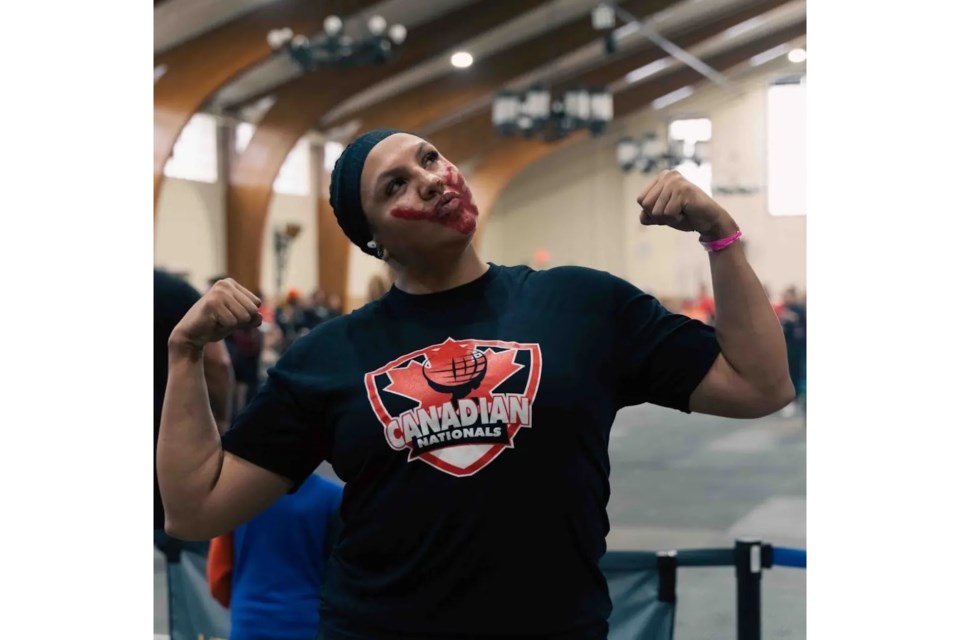LAKELAND – Sitting in a room with over 200 individuals, many of them athletes, Angela Houle waited in anticipation as names were called in recognition of their feats.
With sweat trickling down her cheeks and her heart pumping with anxiety, Houle listened for her name. Finally, the speaker said, “We’re awarding a pro-status athlete...” to Angela Houle.
Her body shook, and she was unable to even smile as she watched her friends at the table break into tears, hugging her in joy after making history as the first Indigenous woman in Canada to be awarded pro card status in her respective sport.
“Did I do this?” she thought, still stunned when images of her children crossed her mind, and then she realized she did, and all the hard work had paid off.
Then, she burst into tears.

From humble beginnings
Houle is from Whitefish (Goodfish) Lake First Nation, and on Oct. 22, she was awarded her pro card after winning at the Strongman Corporation Canada’s National Championship in Thunder Bay, Ont.
“I do this for my kids... Everything I do is for my children, and everything I do is for our youth,” says Houle, as she recalls her recent victory. She says she also wants to use her platform to inspire Indigenous youth.
Whitefish (Goodish) Lake First Nation #128 is located about 60 kilometres northwest of St. Paul and about 70 kilometres southeast of Lac La Biche.
“After I had my children, I suffered big time through post-partum depression, and with that came my mental health,” explains Houle. She found the gym to be the “safest” place she could go. “That helped me so much to recover and overcome those boundaries in my self-worth and self-esteem.”
After years of experience in the strongman sport, Houle admits she still feels fear when heading into a competition, “but at the same time, I’m not scared of failing.” For Indigenous youth who may doubt themselves, she says what is important is “to give it your best and give it your all.”
Thoughts such as: “What if I’m not going to win? What if I’m not good enough?” are things that once swam through her head. Every struggle, according to Houle, is a competition against herself, but “nobody else is going to beat me, other than myself.”
She adds, “I don’t care if I win or lose, I’m going to give it my all, and I’m going to give it my best... that’s how I grew to be a better athlete.”
The feeling of fear is an obstacle Houle believes many young people struggle through.
“I think that’s what holds back a lot of our Indigenous youth... they get fearful,” says Houle, which she believes leads to many Indigenous youth dropping out of competitions or not doing well, “because they can’t get out of that fear of failing.”
“Little do they know that failing is so good for us,” because it shapes people into who they are, she says.
A huge motivating factor for Houle is her children. She aims to show them how to “make the best of it and push through with your life,” and to set goals and be successful.
Indigenous people often face challenges when competing in athletics, and are often seen as outcasts or underdogs, “and I want to change that,” says Houle. At the same time, she also aims to shatter the notion that “everybody is racist.”
“I’ve met some pretty fascinating people in this life and my strongman community,” who are always welcoming, she says. “I think that’s why I love the sport so much.”
Houle adds, “They’re just amazing... and I just love being around empowering women and strong people – because that’s where I belong.”
During the recent competition, Houle painted a red hand print on her face to represent Missing and Murdered Indigenous Women and Girls (MMIWG).
Indigenous women are at a significantly higher risk of being victims of violence or sexual assault. More than six in 10 Indigenous women have experienced physical or sexual assault in their lifetime, according to Statistics Canada, which is significantly higher than non-Indigenous women.
“We’re so targeted, and our women are getting killed left and right,” says Houle, adding, she often reminds her own daughter that she cannot just walk off and go with anybody. “People would just take you away from me, and I’ll never see you again,” she recalls telling her daughter, as her voice briefly shakes.
So, Houle plans to use the platform she has achieved through her success in strongman to talk about “our Missing and Murdered Indigenous Women and Girls.”
She hopes to bring awareness to the families who are suffering and in pain “because their loved ones haven’t come,” she says, adding, “It hits close to home because, sadly, our numbers are high right now all over Canada.”
Support for each other
Colten Sloan, Houle’s cousin, says he is proud of his cousin’s recent accomplishments. The pair have trained together and about a year ago, Sloan became the first Indigenous male strongman awarded a pro-card in Canada.
RELATED STORY - Sloan becomes first Indigenous strongman to earn pro card
“It’s really beautiful seeing her hard work and she can finally show all of that hard work,” says Sloan.
He says he is also proud of Houle’s constant attempt to uplift Indigenous youth.
“We’re constantly shed in a very dark light, and we’re looked down upon,” says Sloan. “Our Indigenous youth see that and feel that.” He hopes that Houle’s recent success “might help shine a better light on us,” along with giving youth a sense of pride in who they are and where they are from.
Working hard
As she nears 40 years old, Houle says she plans to continue to compete, and “to get my foot in the door for our Indigenous youth and our kids.”
“Because I'm old now, you know, I'm going to be 40 in a couple of weeks,” she says, adding, “If I could still do this at this age... [while] I'm healthy, I'm going to keep going.”
Houle and Sloan have both been invited to attend the 2023 Arnold Strongman Classic in Columbus, Ohio, U.S., in March of 2023.
Standings
Across multiple weight classes at the national strongman competition, Houle competed in the Open Women’s category, earning 27.5 points in the overall results, according to Strongman Corporation Canada.
Houle was followed by Frances McGarry with 19 points, Kelly Drescher with 18 points, Kailey Burns with 13.5 points, Jocelyn Grimolfson with eight points, and Tabitha MacDonald with two points.



